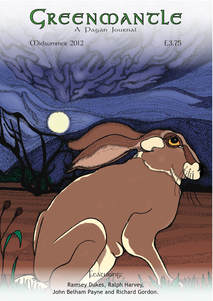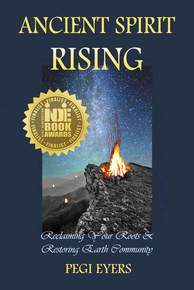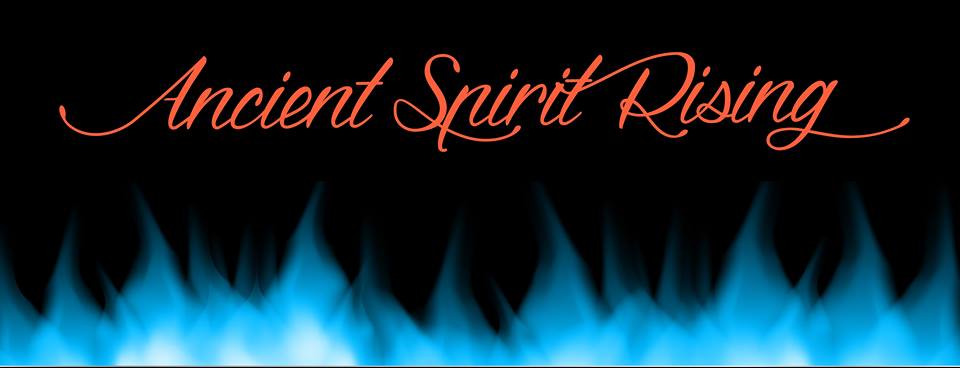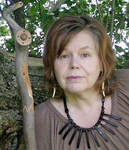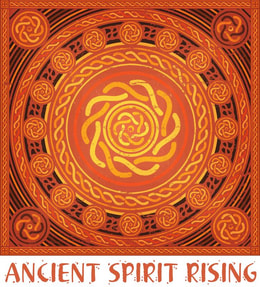PEGI EYERS
Well it was bound to happen. All the positive reviews from experienced activists, academics, community peoples, and folks willing to take up the social justice learning curve, and boom (!) my book Ancient Spirit Rising falls into the hands of someone who is, well, uninformed. I’m open to valid critique on style or content of course, but when a review contains outright errors based on bias, it’s hard not to speak out! This was the case with publisher Paul Pearson, who recently reviewed Ancient Spirit Rising in his UK-based Pagan magazine Greenmantle.
Not to generalize, but I've noticed that folks in the UK make predictable errors when it comes to Settler-Colonialism and contemporary native/non-native intersections here in the Americas, and carry a lot of normalized racism. So here goes, as I address the more glaring misconceptions in Paul Pearson's review.
Dear Greenmantle, here is your full review, with my comments on each section:
[PP] "Drawing on cultural studies and contemporary social justice, Ancient Spirit Rising examines the loss of our vital ethno-cultural connection to tribe and place, and why there is a trend to borrow identities from other cultures. To be sure, this is a passionately written volume, as most dealing with cultural appropriation will be, and there is much to ponder and learn here. The author’s relationship with the Turtle Island First Nations is fascinating, deeply felt, and supported by some thoughtful analysis. As one would expect, her discussion of historical colonialism and its effects on the indigenous cultures in Part One is not an easy read."
[PE] Nice - thanks! Very good so far, but we must continue.
[PP] "However, Eyers not only details the racism, appropriation and cultural destruction of the indigenous culture, but also looks at how such wrongs can be repaired. Part Two of the book falls into a recognizable Pagan “How-to” mode for Animistic practice and Bioregionalism - and most particularly into the 'make it up as you go along' school, which is widespread and perfectly valid within modern Neo-Paganism. It is a shame, however, and not acceptable to all
modern Pagans, to discount the past altogether. Much more could be said about eco-spirituality, and this merely scratches the surface."
[PE] OK fine, but the last two sentences are totally puzzling, as I do write three full chapters - the core of the book - on the different features of Ancestral Mind, Animism and pre-colonial worldviews, in thought and action, and how to recover those dynamics in our lives today. I'm not sure how ASR is contributing to "discounting the past" for modern Pagans (or any other movement) but perhaps you missed those passages entirely. And how exactly can a book that is titled Ancient Spirit Rising discount the past, anyway? (LOL) As for including more on eco-spirituality, there are countless sections scattered throughout the book that fit squarely into that genre, so I'm thinking that you may have missed those as well.
[PP] "While most agree that 'appropriation = bad,' the reality is a highly contentious spectrum of opinions and, self-evidently, not everyone will agree with her position on it. To me it strays slightly too far into self-loathing and racial guilt, and yet without addressing the issue posed by her as a white person writing on behalf of the First Nation in question. There is no acknowledgement of the true complexities of the issue such as, to give just one example, those tribes who have fully welcomed respectful and sincere students, or indeed those individuals within a tribe who have done so while others have not. Thus the book can seem a little heavy-handed and biased, limited in its scope without a balancing counterpoint."
[PE] OK, so here is where I get to defend my thesis (LOL) and discuss your most serious misconceptions and errors. 1) Cultural appropriation is NOT a set of opinions (newsflash!) but a systemic system of dominance, and the final process in the colonization agenda, within a colonizer/colonized dynamic. This is explained at many points in the book, and that regardless of opinion - either native or non-native - the actual definition of cultural appropriation still applies. (You know, the definition that is agreed-upon by the overwhelming majority of activists, academics and community peoples. But you have yet to catch that nuance, unfortunately.)
2) I can't break the news any better on "self-loathing," but unfortunately this phrase is shorthand for white supremacy, as it points to your inability (and that of many other uninformed white people) to consider that critiques of "whiteness" are maybe NOT taboo. To your mind, being white is beyond reproach, which indicates on your part some seriously embedded white superiority and racism. The reality in today's world, is that White Studies is an official department in academia, and the unpacking of white supremacy, racism and white fragility is growing by leaps and bounds across the entire social justice spectrum. Examining our own whiteness, our role in Settler-Colonialism (especially for those still living in the UK - the seat of Empire), our ongoing complicity in those systems, and what we can do to address historic and contemporary injustice is NOT "self-loathing" but a necessary step toward making amends and moving forward to a decolonial future. A dark and ironic aspect of your "self-loathing" statement is that yes, self-loathing does exist, but it develops from the internalized colonization and post-traumatic stress disorder (PTSD) that people of colour and other marginalized groups carry from being oppressed by Empire. (You know - the same Empire created by YOUR country and forced upon the world.) And here's where your statement falls completely apart, as white people have not been socialized to see ourselves as white, so if we do experience "self-loathing" it certainly has nothing to do with ethnicity. You cannot hate what you do not know! I take great care in Ancient Spirit Rising to stress that instead of "white guilt," responsibility is the best way forward. It is evident that you did not actually read the book, Paul Pearson, as you would have found that I advocate for self-empowerment and love for all people, and that I hold the vision for healthy coexistence, and our "Unity in Diversity."
"Being honest about Empire isn't self loathing,
it's accepting responsibility for how we perpetuate it."
Lola Archer Pickett, Wild Playground
3) As for "tribes or individuals who welcome respectful and sincere white students" of course I discuss this dynamic widely in Ancient Spirit Rising, and advocate for cultural sharing. There is no counterpoint required, as my entire thesis is devoted to learning from the values of First Nations! We need to absorb all we can about First Nations to practice good Allyship, but the difference however (and the nuance that you seem to have missed), is that when the white person takes on elements of the Indigenous cultural or spiritual property as part of their own identity, this crosses the boundary line and falls into the exact definition of cultural appropriation (as already discussed). There are other issues of "adopting in" that I don't need to go into here, but again, identity theft is considered to be the worst form of cultural appropriation by the overwhelming majority of activists, academics and community peoples - both native and non-native.
4) As for "heavy-handed and biased" (!) three whole years of research into the most accurate and up-to-date definitions within social justice today, and synthesized for the benefit of readers everywhere, can hardly be described as "biased" - and dealing with serious issues in our society is never a walk in the park. There is probably no kind way to offer these truths, and calling them "heavy-handed" is just a reflection of your own fragility, and your inability to hear them.
[PP] "It is noticeable that anti-appropriation sentiments are sometimes identical to aspects of 'folkish' (racist) rhetoric, and arguments that they come out of a different history have validity but can only be taken so far. (Are the Celtic or Saxon cultures, as those of a conquered people, unavailable for use by those of Norman descent, or whose parents emigrated to another land? Some Celtic reconstructionists believe so.)"
[PE] Wrong again Pearson. I am fully aware of the xenophobic “folkish (racist) rhetoric" on white ancestral recovery that goes on today in white supremacist and Neo-Nazi spaces, and I address it head-on in the section "Ancestral Origins and Cultural Recovery." By conflating anti-appropriation work with folkish rhetoric it sounds like you are sympathizing with the latter, or at least that you have no clue on how to differentiate between the two, which are completely opposite in terms of harm and healing. And since you missed that part in Ancient Spirit Rising, here is a brief synopsis.
"The modern movement to retrieve and practice specific ancestral traditions makes absolutely no claim to an ethnic hierarchy, separatism, or superiority over others, but rather promotes tolerance, peaceful co-existence and cultural recovery for all peoples. Unfortunately, instead of celebrating our ethnocultural roots, the separatist notion of 'racial pride' has been so warped by Eurocentric white supremacy in recent times, that many modern white folks now consider cultural or ethnic integrity to be taboo (for white folks, anyway). Meanwhile the fear is very real that the perverse 'racial purity' agenda of the white nationalists, white supremacists, eugenicists and nazi cults could rise again, and we have to be on guard, but ethnicity aligned with cultural traditions is the way humanity has been self-organized for millennia all over the world, long before the fabrication of 'racial science,' German occultism, or the invention of white superiority. When we look to the colonizer/colonized power imbalance that is our legacy, and the realities in the Americas today, racist or anti-racist white folks who are in no danger of dying out from genocidal attack simply sound ludicrous when making the rules for cultural preservation. The psychoses of Eurocentrism, White Superiority and Ethnic Hierarchy ('racial' stratification) are the only issues that need to be called out and addressed, not the reclaiming, celebrating or practicing of specific pre-colonial earth-rooted ethnoculture(s) by any individual or community."
[PP] "From my own experiences with the Eastern Band of Cherokee Indians, I am fully aware of the adoption and cultural theft of practices and spirituality, and have written passionately about it myself. As such I can appreciate much in this book. Well researched and crammed with references and footnotes, this is a volume that gives food for thought, but no easy answers."
[PE] Why thank you! I can only hope that you become more informed and equipped to write about cultural appropriation in the future. In terms of critiquing whiteness, we have to hold the tension between acknowledging inner and outer white supremacy without becoming defensive or over-emotionalizing the challenge, as we can easily continue to replicate racist behavior. And it is telling that there is a common thread in the English perspective, that makes you the only reviewer of Ancient Spirit Rising so far, to object to a dialogue on whiteness. The unpacking of racism in the UK is only at the very beginning stages, and there is a lot of work to be done~!
Not to generalize, but I've noticed that folks in the UK make predictable errors when it comes to Settler-Colonialism and contemporary native/non-native intersections here in the Americas, and carry a lot of normalized racism. So here goes, as I address the more glaring misconceptions in Paul Pearson's review.
Dear Greenmantle, here is your full review, with my comments on each section:
[PP] "Drawing on cultural studies and contemporary social justice, Ancient Spirit Rising examines the loss of our vital ethno-cultural connection to tribe and place, and why there is a trend to borrow identities from other cultures. To be sure, this is a passionately written volume, as most dealing with cultural appropriation will be, and there is much to ponder and learn here. The author’s relationship with the Turtle Island First Nations is fascinating, deeply felt, and supported by some thoughtful analysis. As one would expect, her discussion of historical colonialism and its effects on the indigenous cultures in Part One is not an easy read."
[PE] Nice - thanks! Very good so far, but we must continue.
[PP] "However, Eyers not only details the racism, appropriation and cultural destruction of the indigenous culture, but also looks at how such wrongs can be repaired. Part Two of the book falls into a recognizable Pagan “How-to” mode for Animistic practice and Bioregionalism - and most particularly into the 'make it up as you go along' school, which is widespread and perfectly valid within modern Neo-Paganism. It is a shame, however, and not acceptable to all
modern Pagans, to discount the past altogether. Much more could be said about eco-spirituality, and this merely scratches the surface."
[PE] OK fine, but the last two sentences are totally puzzling, as I do write three full chapters - the core of the book - on the different features of Ancestral Mind, Animism and pre-colonial worldviews, in thought and action, and how to recover those dynamics in our lives today. I'm not sure how ASR is contributing to "discounting the past" for modern Pagans (or any other movement) but perhaps you missed those passages entirely. And how exactly can a book that is titled Ancient Spirit Rising discount the past, anyway? (LOL) As for including more on eco-spirituality, there are countless sections scattered throughout the book that fit squarely into that genre, so I'm thinking that you may have missed those as well.
[PP] "While most agree that 'appropriation = bad,' the reality is a highly contentious spectrum of opinions and, self-evidently, not everyone will agree with her position on it. To me it strays slightly too far into self-loathing and racial guilt, and yet without addressing the issue posed by her as a white person writing on behalf of the First Nation in question. There is no acknowledgement of the true complexities of the issue such as, to give just one example, those tribes who have fully welcomed respectful and sincere students, or indeed those individuals within a tribe who have done so while others have not. Thus the book can seem a little heavy-handed and biased, limited in its scope without a balancing counterpoint."
[PE] OK, so here is where I get to defend my thesis (LOL) and discuss your most serious misconceptions and errors. 1) Cultural appropriation is NOT a set of opinions (newsflash!) but a systemic system of dominance, and the final process in the colonization agenda, within a colonizer/colonized dynamic. This is explained at many points in the book, and that regardless of opinion - either native or non-native - the actual definition of cultural appropriation still applies. (You know, the definition that is agreed-upon by the overwhelming majority of activists, academics and community peoples. But you have yet to catch that nuance, unfortunately.)
2) I can't break the news any better on "self-loathing," but unfortunately this phrase is shorthand for white supremacy, as it points to your inability (and that of many other uninformed white people) to consider that critiques of "whiteness" are maybe NOT taboo. To your mind, being white is beyond reproach, which indicates on your part some seriously embedded white superiority and racism. The reality in today's world, is that White Studies is an official department in academia, and the unpacking of white supremacy, racism and white fragility is growing by leaps and bounds across the entire social justice spectrum. Examining our own whiteness, our role in Settler-Colonialism (especially for those still living in the UK - the seat of Empire), our ongoing complicity in those systems, and what we can do to address historic and contemporary injustice is NOT "self-loathing" but a necessary step toward making amends and moving forward to a decolonial future. A dark and ironic aspect of your "self-loathing" statement is that yes, self-loathing does exist, but it develops from the internalized colonization and post-traumatic stress disorder (PTSD) that people of colour and other marginalized groups carry from being oppressed by Empire. (You know - the same Empire created by YOUR country and forced upon the world.) And here's where your statement falls completely apart, as white people have not been socialized to see ourselves as white, so if we do experience "self-loathing" it certainly has nothing to do with ethnicity. You cannot hate what you do not know! I take great care in Ancient Spirit Rising to stress that instead of "white guilt," responsibility is the best way forward. It is evident that you did not actually read the book, Paul Pearson, as you would have found that I advocate for self-empowerment and love for all people, and that I hold the vision for healthy coexistence, and our "Unity in Diversity."
"Being honest about Empire isn't self loathing,
it's accepting responsibility for how we perpetuate it."
Lola Archer Pickett, Wild Playground
3) As for "tribes or individuals who welcome respectful and sincere white students" of course I discuss this dynamic widely in Ancient Spirit Rising, and advocate for cultural sharing. There is no counterpoint required, as my entire thesis is devoted to learning from the values of First Nations! We need to absorb all we can about First Nations to practice good Allyship, but the difference however (and the nuance that you seem to have missed), is that when the white person takes on elements of the Indigenous cultural or spiritual property as part of their own identity, this crosses the boundary line and falls into the exact definition of cultural appropriation (as already discussed). There are other issues of "adopting in" that I don't need to go into here, but again, identity theft is considered to be the worst form of cultural appropriation by the overwhelming majority of activists, academics and community peoples - both native and non-native.
4) As for "heavy-handed and biased" (!) three whole years of research into the most accurate and up-to-date definitions within social justice today, and synthesized for the benefit of readers everywhere, can hardly be described as "biased" - and dealing with serious issues in our society is never a walk in the park. There is probably no kind way to offer these truths, and calling them "heavy-handed" is just a reflection of your own fragility, and your inability to hear them.
[PP] "It is noticeable that anti-appropriation sentiments are sometimes identical to aspects of 'folkish' (racist) rhetoric, and arguments that they come out of a different history have validity but can only be taken so far. (Are the Celtic or Saxon cultures, as those of a conquered people, unavailable for use by those of Norman descent, or whose parents emigrated to another land? Some Celtic reconstructionists believe so.)"
[PE] Wrong again Pearson. I am fully aware of the xenophobic “folkish (racist) rhetoric" on white ancestral recovery that goes on today in white supremacist and Neo-Nazi spaces, and I address it head-on in the section "Ancestral Origins and Cultural Recovery." By conflating anti-appropriation work with folkish rhetoric it sounds like you are sympathizing with the latter, or at least that you have no clue on how to differentiate between the two, which are completely opposite in terms of harm and healing. And since you missed that part in Ancient Spirit Rising, here is a brief synopsis.
"The modern movement to retrieve and practice specific ancestral traditions makes absolutely no claim to an ethnic hierarchy, separatism, or superiority over others, but rather promotes tolerance, peaceful co-existence and cultural recovery for all peoples. Unfortunately, instead of celebrating our ethnocultural roots, the separatist notion of 'racial pride' has been so warped by Eurocentric white supremacy in recent times, that many modern white folks now consider cultural or ethnic integrity to be taboo (for white folks, anyway). Meanwhile the fear is very real that the perverse 'racial purity' agenda of the white nationalists, white supremacists, eugenicists and nazi cults could rise again, and we have to be on guard, but ethnicity aligned with cultural traditions is the way humanity has been self-organized for millennia all over the world, long before the fabrication of 'racial science,' German occultism, or the invention of white superiority. When we look to the colonizer/colonized power imbalance that is our legacy, and the realities in the Americas today, racist or anti-racist white folks who are in no danger of dying out from genocidal attack simply sound ludicrous when making the rules for cultural preservation. The psychoses of Eurocentrism, White Superiority and Ethnic Hierarchy ('racial' stratification) are the only issues that need to be called out and addressed, not the reclaiming, celebrating or practicing of specific pre-colonial earth-rooted ethnoculture(s) by any individual or community."
[PP] "From my own experiences with the Eastern Band of Cherokee Indians, I am fully aware of the adoption and cultural theft of practices and spirituality, and have written passionately about it myself. As such I can appreciate much in this book. Well researched and crammed with references and footnotes, this is a volume that gives food for thought, but no easy answers."
[PE] Why thank you! I can only hope that you become more informed and equipped to write about cultural appropriation in the future. In terms of critiquing whiteness, we have to hold the tension between acknowledging inner and outer white supremacy without becoming defensive or over-emotionalizing the challenge, as we can easily continue to replicate racist behavior. And it is telling that there is a common thread in the English perspective, that makes you the only reviewer of Ancient Spirit Rising so far, to object to a dialogue on whiteness. The unpacking of racism in the UK is only at the very beginning stages, and there is a lot of work to be done~!
| Pegi Eyers is the author of Ancient Spirit Rising: Reclaiming Your Roots & Restoring Earth Community, an award-winning book that explores strategies for social justice, uncolonization, ethnocultural identity, building land-emergent community and resilience in times of massive change. Available from Stone Circle Press or Amazon |
